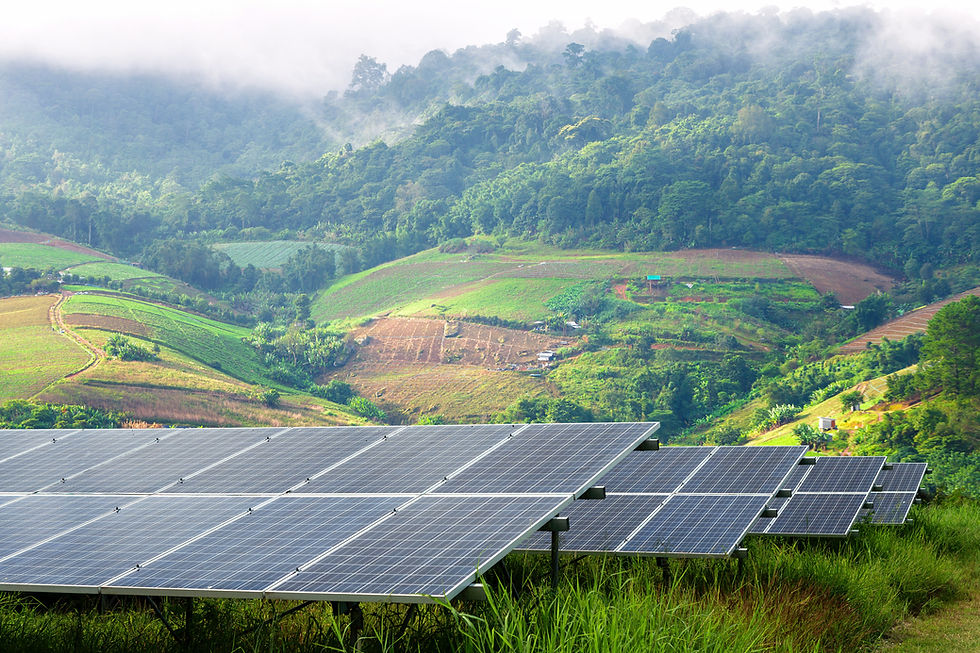"The Importance of Renewable Energy for a Sustainable Future":
- The Moolah Team
- Jun 2, 2023
- 8 min read
This blog post will cover the benefits of renewable energy sources like solar, wind, and hydropower, and why transitioning away from fossil fuels is essential for protecting the environment and combating climate change.
We will also discuss the challenges of implementing renewable energy on a larger scale and potential solutions.
I. Introduction
The Importance of Renewable Energy for a Sustainable Future
As the world continues to grapple with the impacts of climate change, the importance of renewable energy sources like solar, wind, and hydropower has become increasingly clear. These sources of energy are not only more environmentally friendly than fossil fuels, but they also offer numerous economic and social benefits. However, transitioning away from fossil fuels and towards renewable energy is not without its challenges. In this post, we will explore the benefits of renewable energy sources and why they are essential for protecting the environment and combating climate change. We will also discuss the challenges of implementing renewable energy on a larger scale and potential solutions.
Renewable energy is a key part of the transition towards a more sustainable future. By harnessing the power of the sun, wind, and water, we can reduce our reliance on fossil fuels and the greenhouse gas emissions they produce. This is critical for mitigating the impacts of climate change, which include more frequent and severe weather events, rising sea levels, and food and water insecurity. The urgency of this transition cannot be overstated, as the effects of climate change are already being felt around the world.
At the same time, renewable energy offers numerous economic and social benefits. For example, it can create jobs in the renewable energy sector, reduce energy costs for households and businesses, and increase energy security and independence for countries and communities. Renewable energy is also an important tool for promoting equity and social justice, as it can provide access to affordable and reliable energy for marginalized communities.
However, transitioning to renewable energy on a larger scale is not without its challenges. For example, integrating renewable energy sources into existing infrastructure and electric grids can be difficult, and the intermittency of some sources like solar and wind can make it challenging to ensure a reliable supply of energy. Additionally, upfront costs for renewable energy systems can be high, which can be a barrier for some communities and businesses.
Despite these challenges, there are numerous solutions and opportunities for accelerating the transition towards renewable energy. From technological advancements to policy and regulatory changes, there are many ways to overcome these challenges and build a more sustainable future.
In this post, we will explore the benefits of renewable energy in more detail and discuss the challenges of implementing it on a larger scale. We will also explore potential solutions and opportunities for accelerating the transition towards renewable energy. Ultimately, our goal is to highlight the importance of renewable energy for a sustainable future and inspire action towards this critical goal.

II. The Benefits of Renewable Energy
Renewable energy sources like solar, wind, and hydropower offer numerous benefits over fossil fuels. In this section, we will explore some of these benefits in more detail.
A. Environmental Benefits
One of the primary benefits of renewable energy is its positive impact on the environment. Unlike fossil fuels, which produce greenhouse gas emissions and contribute to climate change, renewable energy sources produce little to no emissions. This means that they can help mitigate the impacts of climate change, including rising temperatures, more frequent and severe weather events, and food and water insecurity.
In addition, renewable energy sources have a much lower impact on natural resources like land and water. Fossil fuel extraction can be incredibly resource-intensive and can have negative impacts on local ecosystems and communities. By contrast, renewable energy sources require little to no extraction and have a much smaller environmental footprint.
B. Economic Benefits
Renewable energy also offers numerous economic benefits. For example, it can create jobs in the renewable energy sector, which can help support local economies and communities. According to the International Renewable Energy Agency, the renewable energy sector employed 11.5 million people globally in 2019, and this number is expected to continue growing.
Renewable energy can also reduce energy costs for households and businesses. As the cost of renewable energy technologies like solar and wind continues to decline, they are becoming increasingly competitive with fossil fuels. This can help reduce energy bills for households and businesses, which can help free up resources for other important priorities.
C. Social Benefits
Renewable energy can also have significant social benefits. For example, it can provide access to affordable and reliable energy for marginalized communities, which can help reduce energy poverty and promote equity and social justice. This is particularly important in developing countries, where access to energy can be limited and unreliable.
Renewable energy can also increase energy security and independence for countries and communities. By diversifying energy sources and reducing reliance on imported fuels, renewable energy can help promote energy independence and reduce geopolitical risks associated with energy dependence.
Overall, the benefits of renewable energy are numerous and far-reaching. From its positive impact on the environment to its economic and social benefits, renewable energy is an essential part of building a more sustainable future. In the next section, we will explore some of the challenges of transitioning to renewable energy and potential solutions.

III. Challenges and Solutions for Implementing Renewable Energy
While renewable energy offers numerous benefits, transitioning away from fossil fuels can be a complex and challenging process. In this section, we will explore some of the challenges associated with implementing renewable energy on a larger scale and potential solutions to overcome them.
A. Intermittency and Storage
One of the main challenges of renewable energy is its intermittency. Solar and wind energy are dependent on weather conditions, and energy production can fluctuate throughout the day and night. This can make it difficult to match energy supply with demand, which can lead to grid instability and blackouts.
One potential solution to this challenge is energy storage. Battery storage systems can help store excess energy produced during times of high production and release it during times of low production. This can help balance the grid and ensure a more stable and reliable energy supply.
B. Infrastructure and Grid Integration
Another challenge associated with renewable energy is infrastructure and grid integration. Building new renewable energy infrastructure and integrating it into existing grid systems can be complex and costly. In addition, the location of renewable energy resources like solar and wind may not always align with population centre's or existing infrastructure, which can create additional challenges.
To overcome these challenges, it is important to invest in grid infrastructure and modernization. This can help ensure that renewable energy resources are effectively integrated into existing grid systems and can support a reliable and stable energy supply.
C. Cost and Investment
Another challenge associated with renewable energy is cost and investment. While renewable energy technologies like solar and wind are becoming increasingly cost-competitive with fossil fuels, the upfront costs associated with building new infrastructure can still be significant. This can make it difficult for some communities and countries to invest in renewable energy, particularly in developing countries where resources may be limited.
One potential solution to this challenge is to increase investment in renewable energy research and development. This can help drive down the cost of renewable energy technologies and make them more accessible and affordable for all communities.
Overall, while there are certainly challenges associated with implementing renewable energy on a larger scale, there are also numerous potential solutions. By investing in energy storage, grid infrastructure, and renewable energy research and development, we can overcome these challenges and build a more sustainable and resilient energy system for the future.

IV. The Role of Government and Individuals in the Transition to Renewable Energy
Transitioning to renewable energy is a complex process that requires the involvement of various stakeholders, including governments, businesses, and individuals. In this section, we will explore the role that governments and individuals can play in accelerating the transition to renewable energy.
A. Government Policies and Regulations
Governments can play a crucial role in promoting the adoption of renewable energy by implementing policies and regulations that incentivize the use of clean energy sources. For example, many countries offer tax credits or subsidies for renewable energy installations, which can make them more affordable for individuals and businesses.
In addition, governments can set renewable energy targets and implement regulations that require utilities to generate a certain percentage of their electricity from renewable sources. These policies can create a market demand for renewable energy and help accelerate the transition away from fossil fuels.
B. Individual Actions and Choices
While governments play an important role in promoting renewable energy, individuals also have a role to play in the transition. By making conscious choices about their energy consumption, individuals can reduce their carbon footprint and help drive demand for renewable energy.
Some ways that individuals can contribute to the transition to renewable energy include:
Installing solar panels or wind turbines on their property
Using energy-efficient appliances and light bulbs
Conserving energy by turning off lights and unplugging devices when not in use
Choosing to purchase electricity from renewable sources
Supporting businesses that prioritize sustainability and renewable energy
By making these choices and supporting renewable energy, individuals can help drive demand for clean energy sources and accelerate the transition away from fossil fuels.
C. Collaboration and Collective Action
Finally, it is important to recognize that the transition to renewable energy will require collaboration and collective action. By working together, governments, businesses, and individuals can overcome the challenges associated with transitioning to clean energy and build a more sustainable and resilient energy system for the future.
This collaboration can take many forms, from businesses partnering with renewable energy providers to individuals participating in community solar projects. By working together and sharing knowledge and resources, we can accelerate the transition to renewable energy and create a more sustainable future for all.
In conclusion, the transition to renewable energy is a complex but necessary process that requires the involvement of various stakeholders, including governments, businesses, and individuals. By implementing policies and regulations that incentivize the use of clean energy sources, making conscious choices about energy consumption, and collaborating and working together, we can build a more sustainable and resilient energy system for the future.

V. Conclusion: The Benefits of Renewable Energy and the Urgency of Action
In this blog post, we have explored the benefits of renewable energy and the urgent need to transition away from fossil fuels for a sustainable future. Renewable energy sources like solar, wind, and hydropower offer numerous benefits, including reduced greenhouse gas emissions, improved air and water quality, and increased energy security.
However, transitioning to renewable energy on a large scale presents numerous challenges, including technological barriers, political and economic obstacles, and the need for large-scale infrastructure investments. Despite these challenges, the benefits of renewable energy far outweigh the costs, both in terms of environmental sustainability and economic growth.
The urgency of action is clear. Climate change poses an existential threat to our planet, and the window for action is rapidly closing. The Intergovernmental Panel on Climate Change (IPCC) has warned that we have less than a decade to take decisive action to limit global warming to 1.5°C above pre-industrial levels and avoid the worst impacts of climate change.
To meet this challenge, we must act boldly and urgently to transition to renewable energy and reduce our reliance on fossil fuels. This will require a concerted effort from governments, businesses, and individuals around the world. It will require investments in renewable energy infrastructure, innovative technologies, and policies and regulations that incentivize the use of clean energy sources.
But the benefits of taking action are immense. By transitioning to renewable energy, we can create a more sustainable and resilient energy system, protect our planet and its natural resources, and build a healthier, more prosperous future for all.
In conclusion, the transition to renewable energy is not only necessary but urgent. It is our responsibility to act now to build a sustainable future for ourselves and future generations. By embracing the benefits of renewable energy and working together to overcome the challenges, we can create a better world for all.
Thank you for taking the time to read our blog post on the importance of renewable energy for a sustainable future. We hope that this article has provided you with a comprehensive understanding of the benefits of renewable energy and the urgent need to transition away from fossil fuels.
If you enjoyed this post and want to stay up-to-date with the latest news and insights on renewable energy, sustainability, and environmental issues, please consider subscribing to our newsletter.
Together, we can build a brighter and more sustainable future for ourselves and future generations. Thank you again for reading, and we look forward to hearing your thoughts and feedback in the comments section below.
Thanks a million!
From Moolah







Comments